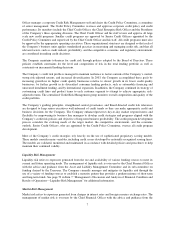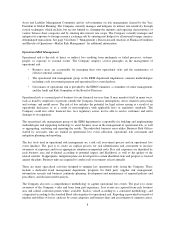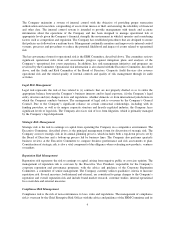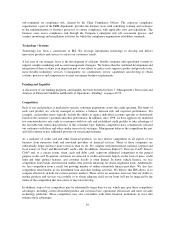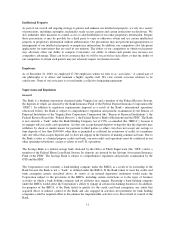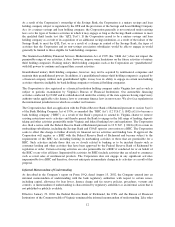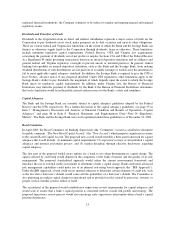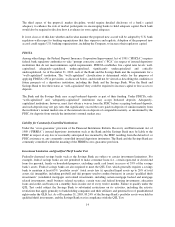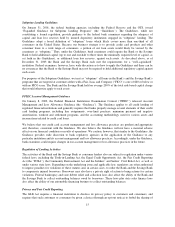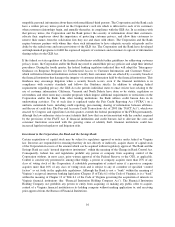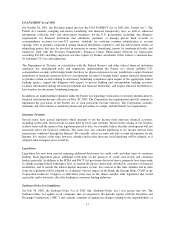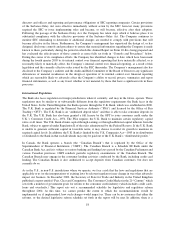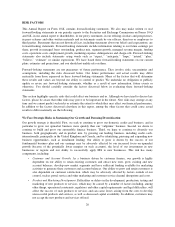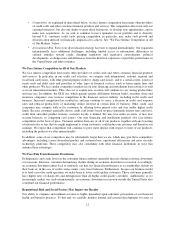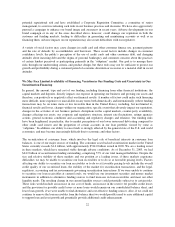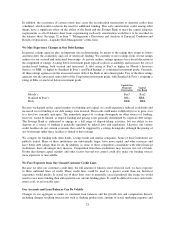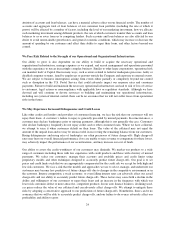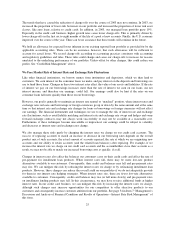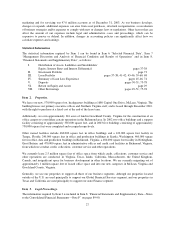Capital One 2003 Annual Report Download - page 35
Download and view the complete annual report
Please find page 35 of the 2003 Capital One annual report below. You can navigate through the pages in the report by either clicking on the pages listed below, or by using the keyword search tool below to find specific information within the annual report.USA PATRIOT Act of 2001
On October 26, 2001, the President signed into law the USA PATRIOT Act of 2001 (the “Patriot Act”). The
Patriot Act contains sweeping anti-money laundering and financial transparency laws as well as enhanced
information collection tools and enforcement mechanics for the U.S. government, including: due diligence
requirements for financial institutions that administer, maintain, or manage private bank accounts or
correspondence accounts for non-U.S. persons; standards for verifying customer identification at account
opening; rules to promote cooperation among financial institutions, regulators, and law enforcement entities in
identifying parties that may be involved in terrorism or money laundering; reports by nonfinancial trades and
businesses filed with the Treasury Department’s Financial Crimes Enforcement Network for transactions
exceeding $10,000; and filing suspicious activities reports by brokers and dealers if they believe a customer may
be violating U.S. laws and regulations.
The Department of Treasury in consultation with the Federal Reserve and other federal financial institution
regulators has promulgated rules and regulations implementing the Patriot Act which: prohibit U.S.
correspondent accounts with foreign banks that have no physical presence in any jurisdiction; require financial
institutions to maintain certain records for correspondent accounts of foreign banks; require financial institutions
to produce certain records relating to anti-money laundering compliance upon request of the appropriate federal
banking agency; require due diligence with respect to private banking and correspondent banking accounts;
facilitate information sharing between government and financial institutions, and require financial institutions to
have in place an anti-money laundering program.
In addition, an implementing regulation under the Patriot Act regarding verification of customer identification by
financial institutions became effective on May 30, 2003. The Corporation has implemented and will continue to
implement the provisions of the Patriot Act as such provisions become effective. The Corporation currently
maintains and will continue to maintain policies and procedures to comply with the Patriot Act requirements.
Interstate Taxation
Several states have passed legislation which attempts to tax the income from interstate financial activities,
including credit cards, derived from accounts held by local state residents. Based on the volume of our business
in these states and the nature of the legislation passed to date, we currently believe that this development will not
materially affect our financial condition. The states may also consider legislation to tax income derived from
transactions conducted through the Internet. We currently solicit accounts and take account information via the
Internet. It is unclear at this time, however, whether and in what form any such legislation will be adopted, or if
adopted, what its impact on us would be.
Legislation
Legislation has now been enacted requiring additional disclosures for credit cards and other types of consumer
lending. Such legislation places additional restrictions on the practices of credit card issuers and consumer
lenders generally. In addition to the FCRA and FACT Act provisions discussed above, proposals have been made
to change existing federal bankruptcy laws, to expand the privacy protections afforded to customers of financial
institutions, and to reform the federal deposit insurance system. It is unclear at this time whether and in what
form any legislation will be adopted or, if adopted, what its impact on the Bank, the Savings Bank, COAF or the
Corporation would be. Congress or individual states may in the future consider other legislation that would
materially and/or adversely affect the banking or consumer lending industries.
Sarbanes-Oxley Act Compliance
On July 30, 2002, the Sarbanes-Oxley Act of 2002 (the “Sarbanes-Oxley Act”) was passed into law. The
Sarbanes-Oxley Act applies to all companies that are required to file periodic reports with the Securities and
Exchange Commission (“SEC”) and contains a number of significant changes relating to the responsibilities of
17


